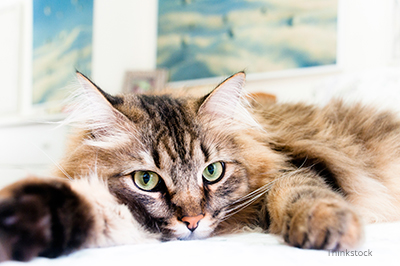
Was your cat just diagnosed with feline herpesvirus (FHV-1)?
Don’t worry – it’s not contagious to you; however, it’s very contagious to other cats!
To clarify, feline herpesvirus isn’t a sexually transmitted disease. It’s a virus infection that is similar to the human virus that causes cold sores. Feline herpesvirus most commonly affects the eyes, the respiratory tract and the gastrointestinal tract. Rarely, feline herpesvirus can potentially affect the skin, the reproductive tract, and the musculoskeletal tract1,2. In cats, clinical signs can be seen within 2-5 days of exposure to the virus. The most common clinical signs seen from feline herpesvirus include:
- Sneezing
- Runny eyes
- Pink eyelids (e.g., conjunctivitis)
- Lethargy
- Fever
- Not eating/anorexia
- Weight loss
- Drooling
- Dehydration
- Increased respiratory effort
- Loud, snoring-like breathing
- Severe ulcers on the eyes (less common)
- Rupture of the cornea (rare)
- Lameness (rare)
- Dermatitis
- Death (rare)
What’s your cat’s risk of getting feline herpesvirus?
Feline herpesvirus is a virus that is more commonly seen in the spring and summer, when kittens are born. Young, unvaccinated kittens are more at risk for this infection, as are immunosuppressed cats (due to feline immunodeficiency virus [FIV], feline leukemia [FeLV] or feline infectious peritonitis [FIP]). Also, multi-cat households or certain cat-crowded environments (again, such as shelters, catteries, outdoor feral cats) are more likely to have problems with feline herpesvirus.
Feline herpesvirus is just one of the many types of causes of feline upper respiratory infections (URI). Other causes of feline URI include:
- Feline calicivirus (FCV), a virus
- Chlamydia, a bacteria
- Rarer organisms such as Bordatella bronchiseptica or Mycoplasma
So, if you just adopted a cat from a shelter or purchased a cat from a cattery or breeder, know that transmission to your other household cats can occur when you bring a new cat into the environment. That’s because feline herpesvirus is extremely contagious and infectious. It’s typically transmitted by bodily fluids (such as discharge from the nose or eyes) or by aerosolization (e.g., sneezing)3. Sometimes unsanitary conditions due to inappropriate disinfection can further the spread of this common infection (e.g., in a cattery or shelter).How long will feline herpesvirus last?
Unfortunately, it can take an average of 7-10 days before clinical signs of feline herpesvirus resolve3. Also, just like when you get cold sores when you are stressed, know that some cats can have relapses of clinical signs of herpesvirus even years later, as the virus hides in the body (is latent).
Treating feline herpesvirus
Unfortunately, there is no cure for feline herpesvirurs, as treatment is symptomatic and supportive. Some helpful hints?
- Quarantine: Keep your newly adopted cat away from other cats due to the contagious nature of this disease.
- Nursing care: If your cat is showing signs of nasal or eye discharge, make sure to keep your cat kept free of discharge. Blot away any discharge with a damp paper towel or terry cloth rag. This is important to help prevent the nostrils from being blocked up from nasal crusting.
- Moisture: Take your cat into the bathroom while you’re taking a hot shower (Note: NOT into the shower, but into the bathroom). This way, the steam can help humidify the nasal passages and make your cat breathe better.
- Tasty food: With herpesvirus, your cats can eat whatever they want! Try to tempt your cat to eat with tasty canned tuna (in water), meat-based human baby food or any kind of tasty canned food. [Editor’s note: Make sure to check with your veterinarian first if your giving your cat anything new.]
- Seek veterinary attention: If you notice abnormal squinting, tearing, redness to the eyes, drooling, not eating, etc., get to a veterinarian immediately! That’s because corneal ulcers or conjunctivitis may need topical antibiotic ointments (e.g., terramycin, oxytetracycline, erythromycin, etc.). Topical, ophthalmic anti-viral ointments can also be used (e.g., cidofovir, etc.). In severe cases, where a secondary bacterial infection occurs (e.g., pus coming from the eyes or nostrils), oral antibiotics may be necessary (just like human colds, viruses typically don’t need antibiotics initially). Keep in mind that antibiotics can often cause cats to lose their appetite, or develop vomiting and diarrhea.
Preventing feline herpesvirus
Prevention: Help prevent feline upper respiratory infections, like herpesvirus, through appropriate vaccination protocols. Work with your veterinarian to make sure your kitten or cat is healthy, and is up to date on vaccines.
When in doubt, the prognosis for feline herpesvirus is good with supportive care.
A veterinary exam is a must in a newly adopted or purchased cat.
If you have any questions or concerns, you should always visit or call your veterinarian -- they are your best resource to ensure the health and well-being of your pets.
References
- Scott FW. Feline Calicivirus Infection. In Blackwell’s Five-Minute Veterinary Consult: Canine & Feline. Eds. Tilley LP, Smith FWK. 2007, 4th ed. Blackwell Publishing, Ames, Iowa. pp. 476-477.
- Norsworthy GD. Feline Rhinotracheitis Virus Infection. In Blackwell’s Five-Minute Veterinary Consult: Canine & Feline. Eds. Tilley LP, Smith FWK. 2007, 4th ed. Blackwell Publishing, Ames, Iowa. pp. 496-497.
- Feline Upper Respiratory Infection. Accessed August 24, 2015
